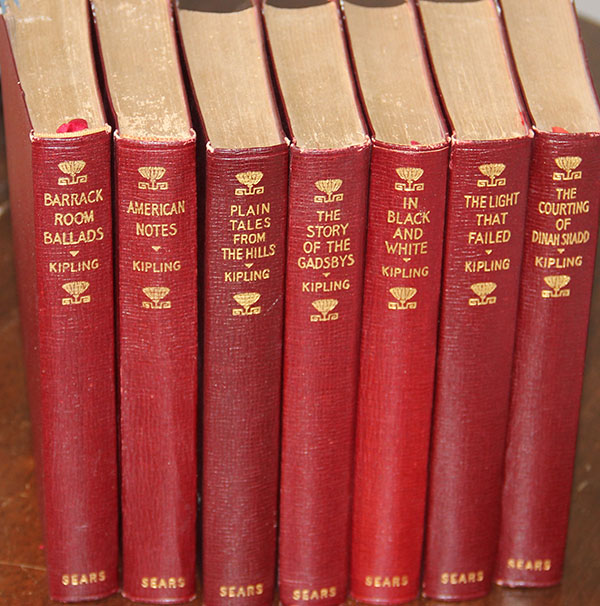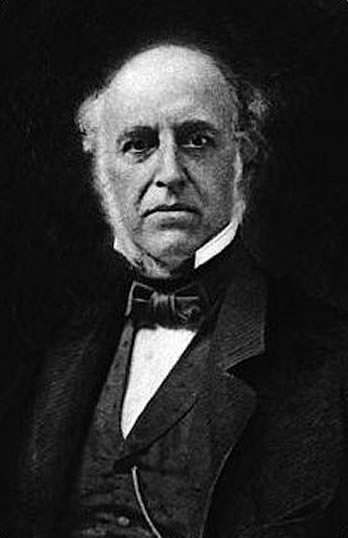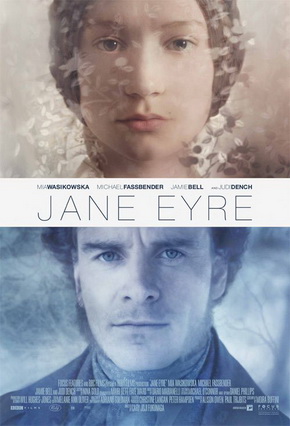Making Room for Kipling
May 6th, 2013
I’ve spoken out before this in favor of Rudyard Kipling; one of late-19th century Britain’s literary giants who has, alas, fallen somewhat out of fashion these days. His major crime, as far as I’ve been able to discern, is being a man’s man who grew up without the benefit of political correctness.

Admittedly, most of my fondness for Kipling stems from Stalky & Co., a vaguely autobiographical account of his public school career, very much in the spirit of Tom Brown, though rather more fun. I haven’t read too much of his other work — just dabbled a bit with Plain Tales from the Hills. Oh, and of course I had Just So Stories when I was a tot. But I’ve always meant to explore further, so you can imagine I jumped at the chance to acquire 7 matching volumes of assorted Kipling this afternoon at Phoenix Books in San Luis Obispo.

I love the edition — it’s undated, but I’m guessing 1910s or 20s. The publisher is J. H. Sears & Company, New York. They’re perfect for our 1920s redwood living room, and I couldn’t wait to see them next to J. M. Barrie on our “aren’t these bindings pretty shelf.” Alas, there doesn’t seem to be any room left. Perhaps some of the less decorative volumes will be willing to make way, though I’m not sure where they’ll go either — we seem to have books stashed in every little hidey-hole you can imagine.

Our Lady
December 12th, 2012
Our local hamlet is putting on a Christmas Musicale later this month. In addition to singing a shaky soprano in the choir, I’m also taking part in a girls trio doing Ave Maria. We’re using Schubert’s setting, since it’s probably the most familiar these days — thanks to Frank Sinatra, et al.
What I didn’t know was that Schubert, who composed the iconic melody and cascading arpeggio accompaniment in 1825, didn’t write it for the Latin prayer. It was part of his seven-song cycle for a German translation of Sir Walter Scott’s Lady of the Lake. I’ll pause a moment while that sinks in. Or maybe you already knew, and I am the only one floored by this revelation, courtesy Wikipedia.

Illustration from Lady of the Lake
Perhaps it hits me particularly hard, since Lady of the Lake is one of my absolute favorites.
He goes to do what I had done,
had Douglas’s daughter been his son…
Doesn’t it just send thrills up your spine? Apparently, Schubert wrote Ellens dritter Gesang (Ellen’s Third Song) for a point in the poem where Ellen prays to the Virgin Mary on behalf of her embattled Highland clan. Here it is in English:
Ave Maria! maiden mild!
Listen to a maiden’s prayer!
Thou canst hear though from the wild;
Thou canst save amid despair.
Safe may we sleep beneath thy care,
Though banish’d, outcast and reviled –
Maiden! hear a maiden’s prayer;
Mother, hear a suppliant child!
Ave MariaAve Maria! undefiled!
The flinty couch we now must share
Shall seem this down of eider piled,
If thy protection hover there.
The murky cavern’s heavy air
Shall breathe of balm if thou hast smiled;
Then, Maiden! hear a maiden’s prayer,
Mother, list a suppliant child!
Ave Maria!Ave Maria! stainless styled.
Foul demons of the earth and air,
From this their wonted haunt exiled,
Shall flee before thy presence fair.
We bow us to our lot of care,
Beneath thy guidance reconciled;
Hear for a maid a maiden’s prayer,
And for a father hear a child!
Ave Maria.
The German pronunciation is a bit beyond me at the moment, but you can bet I’m gonna learn it! I should probably try to dig up the other six songs as well. If this is Ellen’s third, that means at least two more are for soprano…
Mythology
December 3rd, 2012
Note – I am conveniently ignoring the fact that this is my first posting in nearly two months.

This is an engraving of Thomas Bulfinch. His texts on mythology (classical, Arthurian, and romantic) were published in the mid-19th century and remain standards to this day. Geared towards the students of yesteryear, they are engaging, illustrative, and thoroughly enjoyable. Of particular value are the examples he gives from English literature, mostly poetry, pointing out obscure references to the myths under discussion. There were some passages from Milton that I never would have recognized as mythical. I’m not sure yet if Milton’s newly revealed predilection for the Greeks does anything to soften my opinion of him as a priggish misogynist, but it makes me think a little better of De Quincey and Wordsworth (who both idolized Milton).
I’m on a quest to supplement my classical education, sadly lacking in today’s American schools. Though I have no idea what I might have learned about the Greeks and Romans had I not quit traditional high school, I certainly didn’t pick up very much during my preceding years in the public system. All I know of mythology, etc., was acquired from my classically inclined mother during the years when she taught me at home. We studied mythology, art, culture, and Latin as a spoken language…
In addition to Bulfinch, I’ve also been steered towards Robert Graves, but hesitate based on its relative modernity (published in the mid-20th century) and poor reviews. I am however determined to keep a copy of Sir William Smith’s Classical Dictionary (originally published 1844) handy.
Or, maybe if I hurry up and learn to read Latin, I can find some classical authors to add to the mix…
Unwatchable Jane Eyre
September 17th, 2012
Remember a while back when I raved about Zeffirelli’s film of Jane Eyre? I mentioned at the time that I had requested the 2011 film by Cary Fukunaga from the library and was eagerly awaiting its arrival. Well it came, and I set out to watch it, with a surprisingly willing husband in tow.

I don’t know what I was expecting. Fantastic, meticulously accurate costumes? Ramped up sexual overtones? A well-developed St. John character? At least the latter seemed a reasonable hope, considering that the actor playing St. John received a co-star’s billing.
Alas, whatever else the film had to offer, its sadly stilted dialogue (a fault that seems to plague most historical literary dramas of recent years, case in point, the most recent Pride and Prejudice fiasco) and jerky scene-shifting made it utterly impossible to watch. We turned it off about a third of the way through and could never bring ourselves to try again.
For the record, I actually liked the costumes, but only from an aesthetic point of view. They captured the edginess of the 1840s, but more in spirit than historical or literary accuracy.
Why Keats?
July 19th, 2012
Ah, the vagaries of Google. For some reason, despite all the ink I give on this blog to fashion history, costuming, music, and random 19th-century literature, the bulk of the people who visit my site are looking for John Keats. I swear he isn’t here.
I wonder what I’d do with him if he were? Probably a quarantine…

Speaking of romantic poets who died in unfortunate circumstances, I recently learned that John Clare spent his final years in an insane asylum, where his most famous poem was written.
Older Posts »